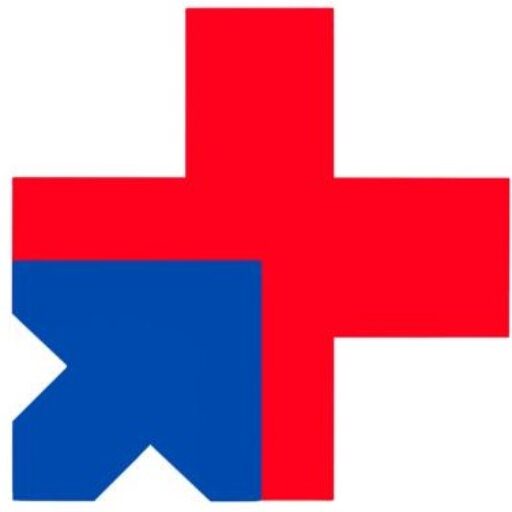Sneezing, itchy eyes, and runny noses – the telltale signs that allergy season has struck your little ones. As a parent, you want nothing more than to ease their discomfort. But with so many options out there, finding the best allergy medicine for kids in 2024 can feel like navigating a maze.
Don’t worry, we’ve got your back! In this guide, we’ll explore best allergy medicine for kids, from antihistamines to nasal sprays. We’ll dive into what works best for different age groups, from toddlers to teens, and discuss both over-the-counter and prescription choices.
We’ll also touch on natural remedies and ways to allergy-proof your home, because sometimes the best defence is a good offence. Whether you’re dealing with seasonal sniffles or year-round symptoms, we’re here to help you find the right solution for your child’s allergy symptoms.
So, let’s roll up our sleeves and get your kids back to feeling their best. After all, allergies shouldn’t stop them from enjoying their childhood adventures!
📌 Key Takeaways:
| Product Name | Active Ingredient | Age Range | Duration of Relief | Best For | Key Feature |
|---|---|---|---|---|---|
| Children’s Zyrtec Allergy Syrup | Cetirizine | 2+ years | 24 hours | Runny nose, sneezing, itchy eyes | Fast-acting |
| Children’s Claritin Chewable Tablets | Loratadine | 2+ years | 24 hours | Outdoor and indoor allergies | Non-drowsy |
| Children’s Allegra Allergy Liquid | Fexofenadine | 2-11 years | 12 hours | Sneezing, runny nose, itchy eyes/throat | Quick action |
| Children’s Benadryl Allergy Liquid | Diphenhydramine | 6+ years | 4-6 hours | Severe symptoms, acute reactions | May cause drowsiness |
| Flonase Children’s Allergy Relief Nasal Spray | Fluticasone propionate | 4+ years | 24 hours | Nasal congestion | Targets nasal symptoms |
Types of Allergy Medicines for Kids
When it comes to finding the best allergy medicine for kids, it’s helpful to understand the different types available. Let’s break them down in simple terms:
Antihistamines
These are the go-to pediatric allergy relief options. They work by blocking histamine, the substance that causes allergy symptoms. Antihistamines can help with sneezing, itchy eyes and runny noses. Some popular brands include Children’s Zyrtec, Claritin and Allegra. Many of these are available as liquids or chewable tablets, making them easy for kids to take.
Nasal Corticosteroids
Don’t let the big word scare you! These are simply nasal sprays that reduce inflammation in the nose. They’re great for tackling stuffy noses and can be very effective for seasonal allergies in kids. Flonase Children’s is a common option in this category.
Decongestants
These medicines help clear up stuffy noses by shrinking swollen blood vessels. While effective, they’re usually recommended for short-term use only. Some allergy medication for kids combine decongestants with antihistamines for double action.
Eye Drops
For kids suffering from itchy, watery eyes, allergy eye drops for kids can provide quick relief. These often contain antihistamines or other ingredients to soothe irritated eyes.
Natural Remedies
Some parents prefer natural allergy remedies for children. These might include saline nasal sprays, honey or certain herbal supplements. While these can be helpful, it’s always best to chat with your doctor before trying them.
💡 Take Note: The best allergy medicine for kids can vary depending on their age, symptoms and overall health. Always read labels carefully and consult with a healthcare professional to find the most suitable option for your child.
How to Choose the Best Allergy Medicine for Kids
Finding the best allergy medicine for kids isn’t a one-size-fits-all affair. Several factors come into play when making this important decision. Let’s break them down:
Age of the Child
The age of your child greatly influences the choice of allergy medicine. For younger children (2-5 years), liquid or chewable forms with lower dosages are often recommended. As kids grow older (6-12 years), more over-the-counter options become suitable. Teens can usually take regular adult dosages, but it’s always wise to check for any restrictions.
Type of Allergy Symptoms
Different medicines target different symptoms. For sneezing and itchy noses, antihistamines like Zyrtec or Claritin work well. Itchy eyes might benefit from antihistamine eye drops. If congestion is the main issue, nasal sprays or decongestants could be more effective.
Duration of Relief Needed
Consider how long you need the medicine to work. For quick, short-term relief, options like Benadryl might be suitable. For long-lasting relief, once-daily antihistamines like Claritin or Zyrtec could be better choices.
Potential Side Effects
Be aware of possible side effects. Antihistamines might cause drowsiness or irritability in some children. Nasal corticosteroids could lead to nasal irritation. Decongestants might increase heart rate. Always weigh the benefits against potential side effects.
Ease of Administration
How easy is it for your child to take the medicine? Liquid forms are often easier for younger kids, while chewable tablets might appeal more to older children. Consider what works best for your family’s routine.
By considering these factors, you’ll be better equipped to choose the most suitable allergy relief for children. Always consult with a healthcare professional to ensure you’re making the best choice for your child’s specific needs.
5 Best Allergy Medicines for Kids
1. Children’s Zyrtec Allergy Syrup
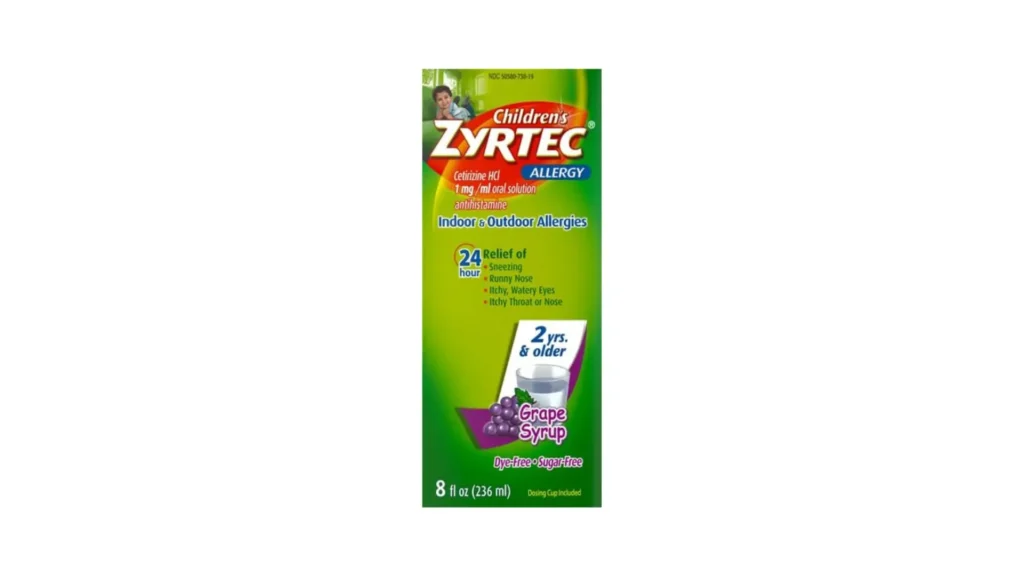
This pediatric allergy relief option contains cetirizine, a powerful antihistamine that provides 24-hour relief. Available in grape and bubblegum flavours, it’s suitable for children aged 2 and up. The dosage varies by age: 2.5 mL for ages 2-5, and 5-10 mL for those 6 and older.
Zyrtec is known for its fast-acting formula, often providing relief within an hour. It’s particularly effective for symptoms like runny nose, sneezing and itchy eyes. While it may cause drowsiness in some children, it’s generally well-tolerated.
2. Children’s Claritin Chewable Tablets
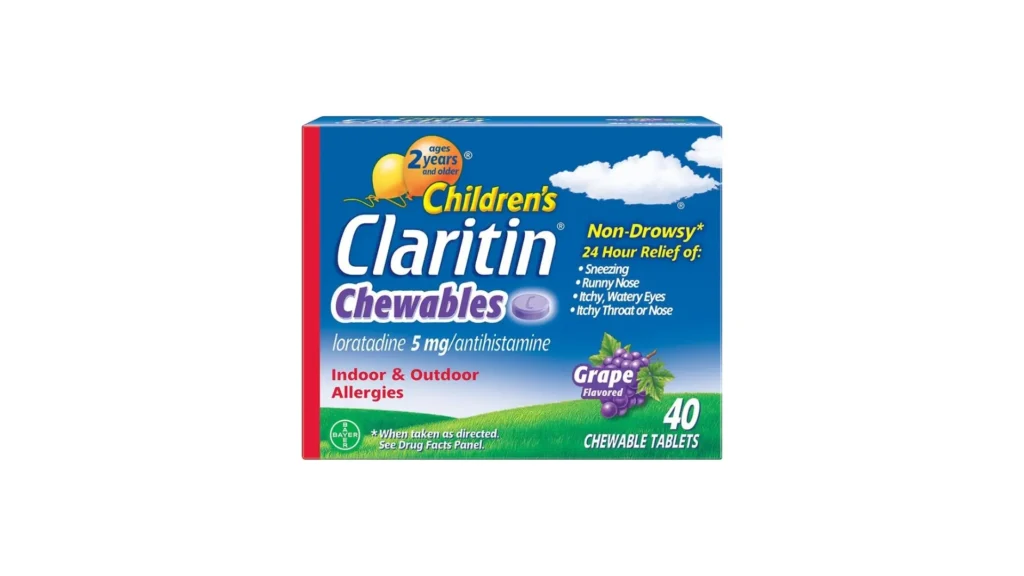
Claritin offers a non-drowsy option for child-friendly allergy treatments. Its active ingredient, loratadine, provides 24-hour relief. These chewable tablets come in grape and bubblegum flavours, making them easy for kids to take. Suitable for children 2 and up, the dosage is one 5 mg tablet daily.
Claritin is particularly effective for outdoor allergies and may help with indoor allergies too. It’s known for causing less drowsiness than some other options, making it ideal for daytime use.
3. Children’s Allegra Allergy Liquid
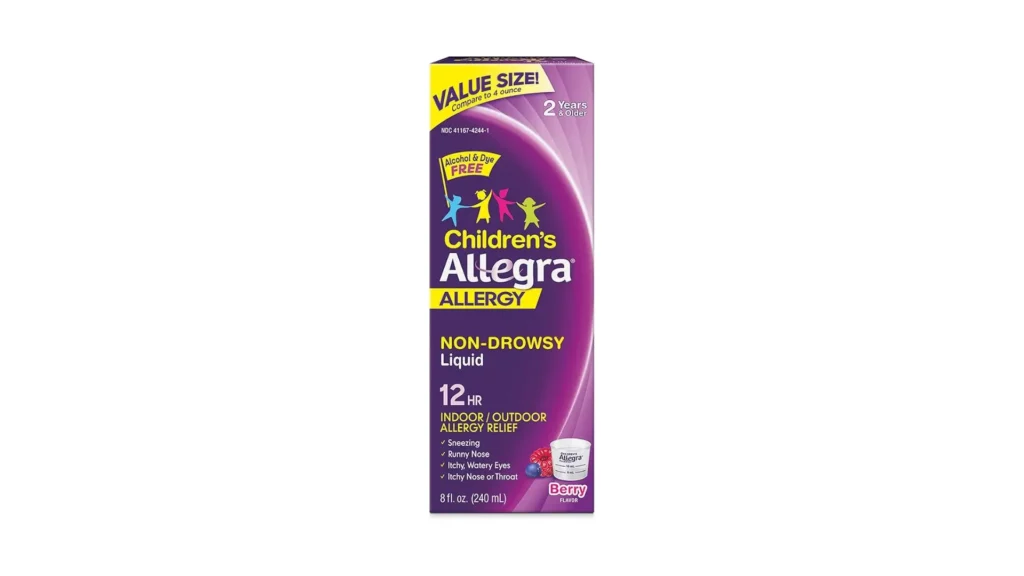
Allegra offers another non-drowsy option for seasonal allergies in kids. Its active ingredient, fexofenadine, provides 12-hour relief. The liquid form is easy to administer and comes in a berry flavour. It’s suitable for children aged 2-11, with dosage based on age and weight.
Allegra is known for its quick action, often providing relief within an hour. It’s particularly effective for symptoms like sneezing, runny nose and itchy eyes or throat.
4. Children’s Benadryl Allergy Liquid
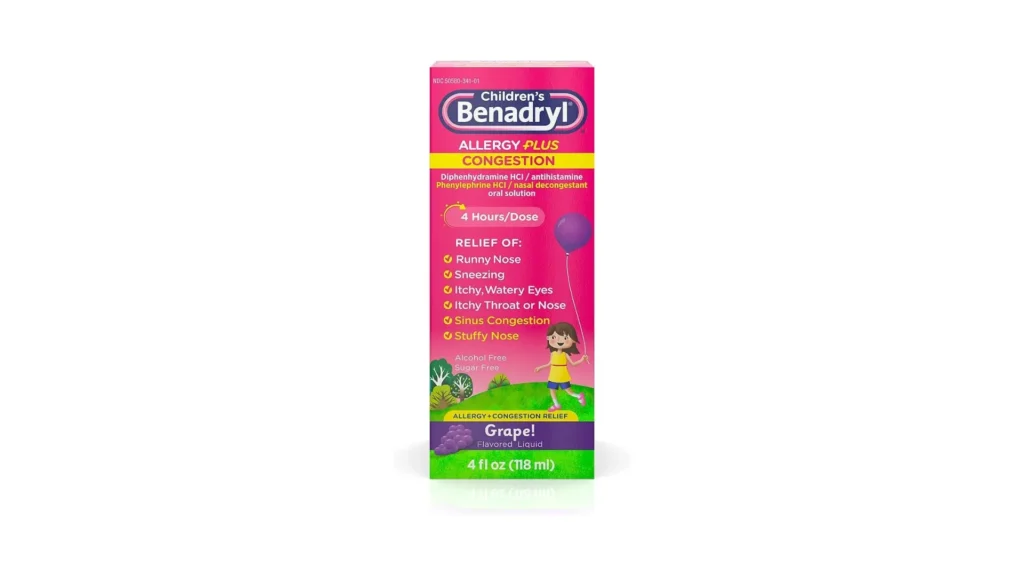
Benadryl is a well-known name in allergy medication for kids. Its active ingredient, diphenhydramine, provides fast relief but for a shorter duration (4-6 hours). Available in cherry and grape flavours, it’s suitable for children 6 and up. The dosage is 10-20 mL every 4-6 hours.
Benadryl is known for its effectiveness in treating severe allergy symptoms and can also help with sleep due to its drowsy side effect. It’s particularly useful for acute allergic reactions.
5. Flonase Children’s Allergy Relief Nasal Spray
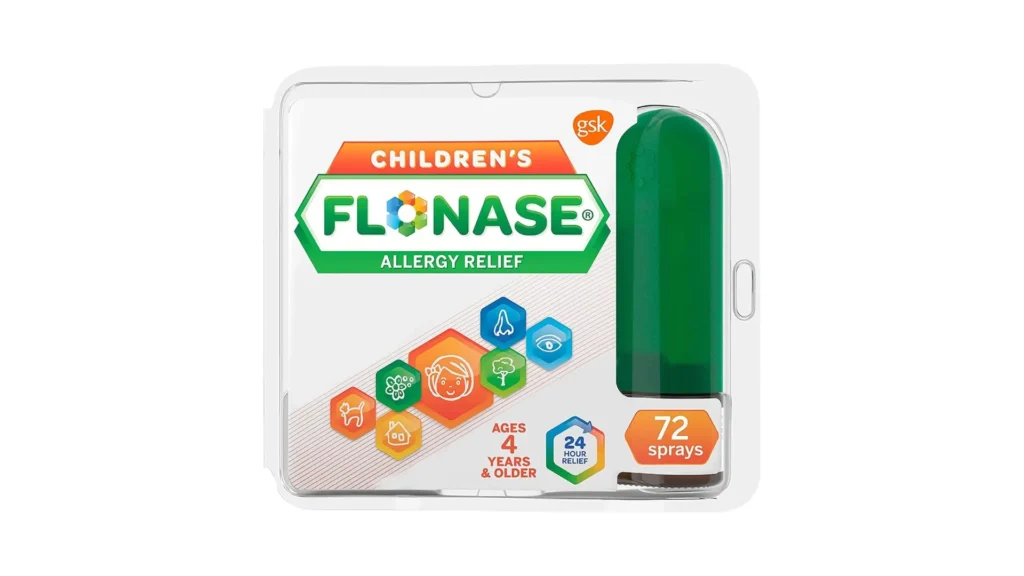
For a different approach to allergy relief for children, Flonase offers a nasal spray. Its active ingredient, fluticasone propionate, is a corticosteroid that reduces inflammation. It’s suitable for children 4 and up, with a recommended dosage of one spray per nostril daily.
Flonase is particularly effective for nasal congestion, a symptom that oral antihistamines don’t always address well. It can take a few days to reach full effectiveness but provides 24-hour relief once it does.
💡 Take Note: While these are considered the best allergy medicine for kids, always consult with a healthcare professional before starting any new medication regimen for your child.
Non-Medicinal Approaches to Managing Childhood Allergies
While finding the best allergy medicine for kids is important, there are several non-medicinal approaches that can complement or even reduce the need for medication.
Let’s explore some effective strategies for managing childhood allergies naturally:
Allergen Avoidance
The first line of defence is to identify and avoid triggers. Common allergens include pollen, dust mites, pet dander and certain foods. Keep windows closed during high pollen days, use allergen-proof bedding and regularly groom pets to reduce dander.
Air Purification
Investing in a good quality air purifier can significantly reduce indoor allergens. Look for models with HEPA filters, which can trap tiny particles like pollen and dust mites. This can be particularly helpful in your child’s bedroom.
Nasal Irrigation
Saline nasal rinses can be an effective natural allergy remedy for children. They help flush out allergens and mucus from the nasal passages. There are kid-friendly neti pots and squeeze bottles available, making this process easier for little ones.
Dietary Changes
Some foods may help reduce allergy symptoms. Foods rich in vitamin C, like citrus fruits and berries, can act as natural antihistamines. Omega-3 fatty acids, found in fish and flaxseeds, may also help reduce inflammation.
Hypoallergenic Products
Use hypoallergenic products for kids such as pillows, mattress covers and cleaning supplies. These can significantly reduce exposure to common allergens in the home.
Regular Cleaning
Frequent vacuuming (with a HEPA filter vacuum), dusting with a damp cloth and washing bedding in hot water can help keep allergens at bay.
Stress Reduction
Believe it or not, stress can worsen allergy symptoms. Encourage relaxation techniques like deep breathing or child-friendly yoga.
While these methods can be very effective for allergy prevention for kids, they work best when combined with proper medical advice. Always consult with a healthcare professional about the best overall approach for managing your child’s allergies.
Take Action for Your Child’s Allergy Relief!
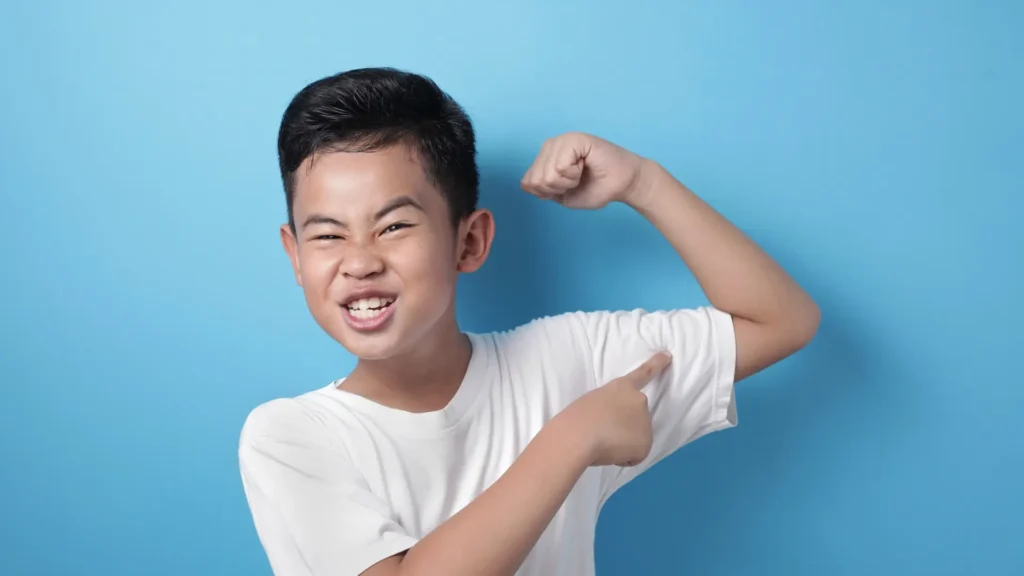
Finding the best allergy medicine for kids is just one part of the puzzle. Combining medication with non-medicinal approaches can provide the most effective allergy relief for children. Don’t hesitate to try different strategies to see what works best for your little one.
While many allergies can be managed at home, there are times when professional help is needed. Consult a pediatrician or allergist if:
- Your child’s symptoms are severe or persistent
- Over-the-counter medicines aren’t providing relief
- Allergies are interfering with daily activities or sleep
- You suspect food allergies or asthma
These experts can provide allergy testing for kids and create a tailored treatment plan.
Every child is unique, and what works for one might not work for another. Be patient and observant as you navigate this journey. With the right approach, you can help your child enjoy life to the fullest, allergies and all.
Take that first step today towards a sneeze-free, itch-free future for your little one!
